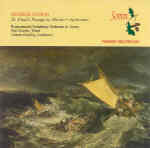Nocturne (from Quo Vadis) is a reissue taken from a 1988 Unicorn-Kanchana release, and now that the complete work is available from Chandos its presence is less of a draw than it once might have been. However, the other two works are new recordings, and very important additions to Dyson’s catalog of choral music. St. Paul’s Voyage to Melita has the singular advantage of depicting a storm at sea, which the composer does with evident relish despite the somewhat austere orchestral palette. The reason for this becomes clear at the end: when St. Paul and his passengers make it safely to dry land, bass drum and chimes create an effect as simple as it is overwhelming.
Agincourt is an appropriately more gutsy setting of works from Shakespeare’s Henry V, and it includes the same Agincourt Song that William Walton made famous in his score for the film version of the play. Both works share the virtues of comparative brevity (about half an hour apiece) and directness, and it’s very easy to imagine the great choral societies for which they were written enjoying them very much in performance. Indeed, it would be very nice if an American choir or two would start exploring this repertoire rather than inflicting yet another Requiem (pick one) or Carmina Burana on their audiences. These are well-crafted crowd pleasers, plain and simple, and as such they deserve to be enjoyed by a wide audience of choral music enthusiasts.
The performances captured here are good, if not perfect. Tenor Neil Mackie’s voice is pretty much shot in St. Paul’s Voyage; it’s rather better in the earlier recording of Nocturne. The Bournemouth Symphony Chorus is not one of England’s best: it sounds under-rehearsed in places (some shaky ensemble), and the women suffer occasional pitch problems–but these aren’t serious liabilities. Happily, Vernon Handley and the Bournemouth Symphony give performances full of conviction and impact. There’s no trace of Victorian (or Edwardian) fustiness, and the recorded sound is warm, well-balanced, and rich. In sum, the music here will reward your attention, particularly if you are already attuned to the style. Just sit down with the words (English only in the booklet) and enjoy.
































